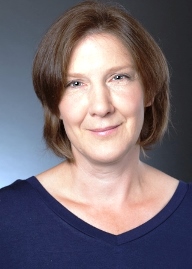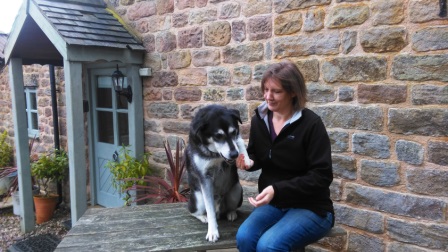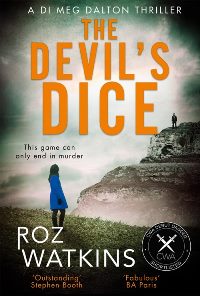
Success
has happened very quickly for you. Your debut crime novel has started a career
at a speed that will be the envy of many. Has this affected your outlook on
writing and being an author?
I feel extremely fortunate! I
got a fantastic agent and publisher very quickly and still sometimes have to
pinch myself. But of course I do still tackle the daily struggle. I was lucky
enough to have the chance to write Book 2 before Book 1 came out. A lot of
people said how difficult it must have been having to wait so long before my
first book was published, but I enjoyed that time. I had the security of a
three-book deal, without yet having the stress of publicity or reviews! It also
gave me a chance to make friends with other writers and develop a bit of a
community before my book came out.
Do you still
tackle the daily struggle?
Dealing with reviews is
challenging. Even good reviews can be stressful because you find yourself
realising you have no idea how you wrote the book and no faith that you can do
it again. So to already have Book 2 finished before Book 1 came out was a huge
bonus.
And as for the negative
reviews… We all get them and I thought I was prepared, but it really does feel
like a complete stranger walking up and punching you in the face, or maybe
punching your baby. So it’s good to have a community of writer friends who know
how it feels.
You
wrote two crime books at school and then went on to a ‘sensible’ life –
Cambridge University and a degree in engineering; law school; partner in a firm
of Patent Attorneys ... and finally mucking out the toilets in a complex of
holiday homes in Derbyshire! Not the
usual career trajectory, and now a successful author. Was there a plan?
I’d like to say there was a
plan, but being honest – not really! I was good at maths and science at school
so was pushed in that direction and I thought engineering would be creative. I
always liked to write, so being a patent attorney seemed to make sense as it
combined science and writing. I coped with it for fifteen years, but it was the
creative side of writing I really loved so it was never a perfect fit for me.
Leaving that career was very difficult, and most people clearly thought I was
mad. In a way I was, but you only get one life and I wanted to live it to the
full. I realise I was very fortunate that my first career was well-paid and
gave me the opportunity to have a second one which is less so! Writing is a
very precarious career so it helps to have paid off the mortgage first.
I don’t regret the patent
attorney career but I’m very glad I didn’t stick with it. There are so many
things in life that interest me, and writing allows me to explore them all. The
holiday cottage mucking out wasn’t exactly a dream job, but it provided an
income in a beautiful location and still gave me time to do other things. I
would never have been able to write a book if I was still a patent attorney,
and I’m endlessly impressed by those who combine writing with an intellectually
demanding job.
You
made the conscious decision to ‘learn’ about becoming a novelist rather than
bash away on a laptop until you got it right. Would you recommend this academic
approach?
For me, it was just the
natural thing to do. I realised rapidly that I had no idea how to write a book.
I’d read thousands but I’d also lived in a few houses and yet had no idea how
to build one. If ever I can’t do something, my approach is to Google it, and/or
read a book on how to do it. I did a huge amount of both of these!
How important
is it to pass on learned skills through courses and seminars on creative
writing?
I really enjoy sharing any
insights I have (although I still feel pretty inexperienced) and local writing courses
helped me a lot. But the sheer quantity of information I needed to learn was so
vast that the main benefit of courses for me was developing a network of
friends and critique partners. Most of the information I learned came from
sitting on my own reading books, going on critiquing websites like Scribophile,
and looking at websites where queries or first pages etc. were analysed.
Your
skills and talent as a writer would allow you to tackle any genre, even
non-fiction, what made you choose the highly competitive crime fiction arena?
I didn’t fancy non-fiction as
it’s the creative side I love. I thought I might as well go for a genre that
tended to sell, and I had a crimey idea. It did all happen a bit randomly
though. I never really meant to write a police procedural as I don’t tend to
read them and had no police knowledge.
The
plot for your debut novel was sparked by your dog finding human remains on a
Peak District ramble (it was, in fact, just your very active imagination). Is
this sort of ‘lightbulb moment’ an important factor in developing a plot?
Definitely! I get a lot of
ideas when walking the dog or clearing up horse manure from the field. If any
aspiring writers would like to do this, we have opportunities…


You
have a top literary agency, one of the world’s biggest publishers,
international book contracts, and the TV rights have been sold successfully.
You have also been nominated for awards. Is this unnerving when you have only
written one book?
Terrifying! Which is why I’m
so relieved that I’d already written Book 2 when Book 1 came out. I had a lot
of moments of panic that I couldn’t do it again, and I think if I’d only
written one book, I might have had a melt down!
Can
you give us a flavour of Book 2 … more human remains from a watery Derbyshire
cave system?
The idea for Dead Man’s
Daughter came from some reading I was doing about cellular memory –
where people have heart transplants and seem to change personality or have
memories that seem to come from the heart’s original owner. I found this very
creepy. In the book, a ten year old girl is found running through the woods,
barefoot and wearing only a blood-soaked nightdress. She has no memory of what
happened to her, but her father is found stabbed to death in their nearby
house. DI Meg Dalton discovers that the girl's murdered father had been
obsessed with his daughter’s recent heart transplant, and that the girl had
been having nightmares, and seemed to remember things that happened to her
heart donor. Who was the donor child and what happened to her? And does this
have anything to do with the murder of the girl's father?

Hardcover, Publisher: HQ; First edition edition (8 Mar. 2018)